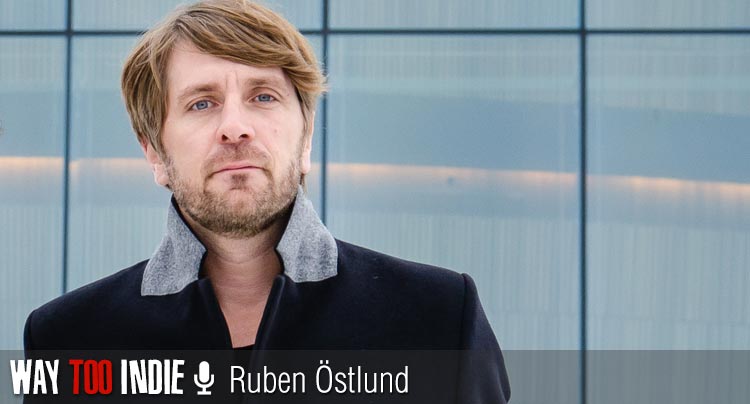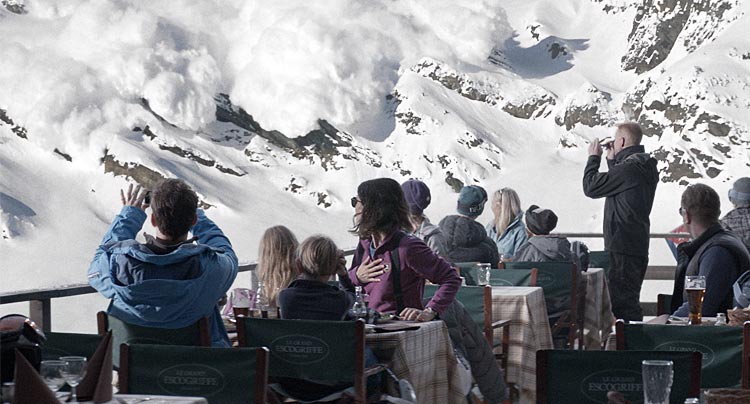‘Force Majeure’ Director Ruben Östlund Wants Viewers Horrified AND Laughing

Swedish filmmaker Ruben Östlund seems to have found a breakthrough hit with his fourth feature Force Majeure. Östlund’s two previous films, Involuntary and Play, gained some popularity on the festival circuit, neither of them coming close to the success of his latest work (in fact, Play and Involuntary don’t have US distribution). Force Majeure focuses on the 5 day vacation of a family in the French Alps. A controlled avalanche near the resort appears to go terribly wrong, and with a wall of snow barreling toward them Tomas, the father, impulsively runs away, leaving his wife and children to fend for themselves. The avalanche turns out to be a false alarm, stopping before it hit the resort, and now the family must deal with the fallout from Tomas’ actions. Force Majeure incisively picks apart gender roles and societal expectations, exposing them for the absurd, hilarious archetypes they really are.
Force Majeure premiered earlier this year at Cannes to critical raves, and since then the film has only gained momentum. Sweden selected the film as its submission for Best Foreign Language Film at the Academy Awards, and in the eyes of some it’s a frontrunner in the category. To promote Force Majeure’s Canadian release, we sat down with Ruben Östlund for a brief chat about what inspires him, his connection to the film’s location, and much more.
Force Majeure will open in Toronto this week before expanding across Canada. If you’re in the US, you can currently catch the film in select theatres before an eventual VOD release.
You said the idea for Force Majeure came from hearing an anecdote by a woman who had a similar experience with her boyfriend. Your previous film Play is based on a series of real-life crimes. Do you tend to find inspiration from real-life incidents?
For Play, when it came to the robbery in itself, what I got interested in was the image of five black boys robbing three white boys. It had so many questions in it. It was a racial question, [a question of] class, society…This was a topic that we have such a problem handling, so we tend to look in another direction. For me it was a provocation in a way that forced us to talk about what we have seen.
In a way Force Majeure is the same thing. It’s a man acting in a way he is not expected to. It is totally forbidden to abandon your family when you’re supposed to stand up for them. There was something about Tomas’ behaviour that is opposite to the whole of film history. The most reproduced character in film history is probably the man as a hero. Maybe the woman as a sex object is more reproduced than the main hero, but Tomas is acting in a way that is really forbidden.
For my friend in kind of the same situation, where he was acting cowardly…He didn’t try to protect his girlfriend. It created a chain reaction of problems, and they were really close to splitting up. They’re still together and have kids now. When I heard their story, I understood something about the set-up of Force Majeure that connects itself to deeper questions. I also got a hold of a sociological study of airplane hijackings where you could see the frequency of divorce is extremely high afterward. And of course it’s because you see a side of your partner that makes you say “I don’t want to continue living with this person.” There was also an investigation about survivors of ship catastrophes from the Titanic to the MS Estonia, and you can see the percentage of survivors are highest with men in a certain age. This is the total opposite from what we’ve learned. We have learned that women and children are first in the lifeboat, but they are actually the ones that die the most. The crew is more likely to survive than the passengers as well. So there was something about catastrophic crisis situations and expectations of how humans behave that was not true at all, and that really interested me.

Your films are bringing things to light that people don’t want to talk about. Do you feel inclined to take from real-life incidents because of this? If this was entirely a creation, if wasn’t based on something real, people may use that as an excuse to say “That’s not real, that’s an invention.” Because you’re taking inspiration from something that actually happened, it’s harder for people to dismiss what you portray.
Exactly. In a way the family, the mother and father and kids in the film are representing the nuclear family. That was very important to me, so it couldn’t be a specific incident. I wanted it to reflect the roles and expectations of a man and a woman in a nuclear family. The kinds of roles that we just, without being aware of it, start to play and engage ourselves in when we are starting a relationship or going into a family.
Why the location in the Alps?
I started out as a ski filmmaker. I was making ski films in my 20s, so I wanted to find a way to get back to that environment. It’s also interesting at a ski resort because there’s a struggle between man and nature. Civilization tries to control the power of nature with controlled avalanches, making tracks in the snow, having all those lifts go up and down. It’s a good place for this kind of drama.
Did you always want to approach this with a comedic tone? What made you want to put comedic elements in the film as opposed to treating this as a straight drama?
I think there’s a lot of comedy in Play also, but they are situations that we’re not used to handling, so we are not allowed to laugh about the kids in Play. But people that are wealthy, living in a luxury hotel, we’re allowed to laugh at them. Life is a comic tragedy. [Laughs] It’s a comedy with a tragic ending; we’re all going to die. I really like when scenes are horrifying in one moment, and humorous in the next. The audience often doesn’t know how to react.
You’ve said your previous films are more conceptual, but this one appeals more to emotions. What made you decide to go down that road with this film?
I guess there are so many things happening inside the characters in Force Majeure that I had to get closer to them. I had to focus on the face more. In my other films the directing was like “If you go over here or stand over here, do this,” but here the actors had to take much more responsibility over the characters. So I guess it was something natural with the topic of the film.
There’s a level of intense precision to the film. I wanted to know about your preparation process. Are you very meticulous about preparing the film in advance?
Yes, I do quite [a bit] but…I mean, every day on set we’re shooting a new scene. I have to rethink and re-evaluate what I thought before and make new decisions. For me it’s very important that I know what the framing should be, and which location and actor that we [use in] the scene, and the acting. I must have a clear view on that, but as soon as we start shooting I immediately understand, “Okay, I have to rethink.” So no matter how much you prepare, shooting is a struggle because you [can be] so insecure. And if you’re not true to your sensibility then it’s a very dangerous moment in filmmaking. You have to be true to your sensibility. If you feel something is wrong here, you can say “I don’t know what it is, maybe try to play it more in this way.” Shooting is a very hard process, it takes a lot of energy. It’s like a war. [Laughs]
